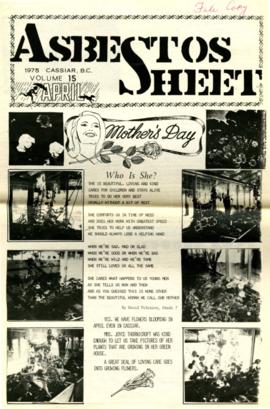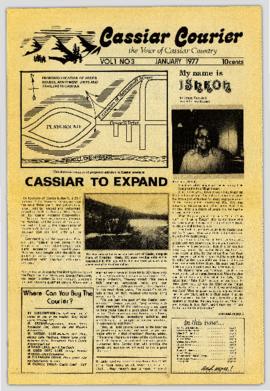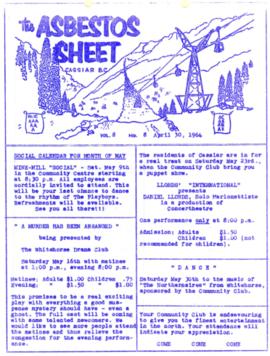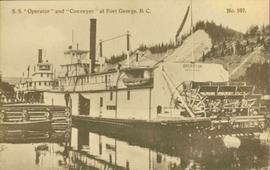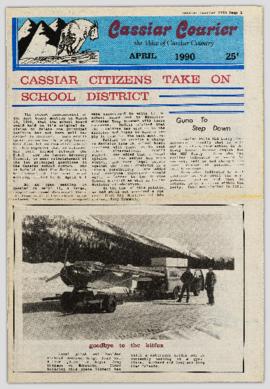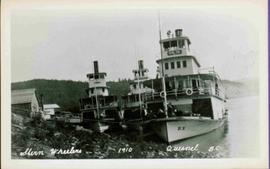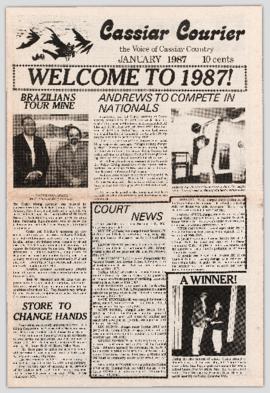File consists of notes, clippings, and reproductions relating to the Cariboo and Northwest Digest publication. Also includes a CD-R that contains Sedgwick's index spreadsheet and accompanying documentation about the publication.
File consists of documents relating to the construction of the Pacific Great Eastern Railway (PGE), which predominantly consist of photocopy reproductions, excerpts from books, and clippings from periodicals. Includes a chronology of the history of PGE, a list of sub-contractors who completed the Squamish sub-division, "PGE/BCR: Dease Lake Extension First 25 Years, 1968 to 1993", and "P.G.E.R. 1914 to 1923: Progressive Dates of Commencement of Passenger Service".
"The Asbestos Sheet" is a newspaper that documents the community and work life of the residents of Cassiar BC. Content includes text and photographs, as well as jokes, comics, and games.
"The Cassiar Courier" is a newspaper that documents the community and work life of the residents of Cassiar BC. Content includes text and photographs, as well as jokes, comics, and games.
"The Asbestos Sheet" is a newspaper that documents the community and work life of the residents of Cassiar BC. Content includes text and photographs, as well as jokes, comics, and games.
Postcard photograph depicts two sternwheelers in dock. Group of men can be seen standing on dock. Steep banks of opposite shore visible in background.
Printed annotation on recto reads: “S.S. “Operator” and “Conveyer” at Fort George, B.C. No. 107.”
Audio recording consists of individual taped interviews conducted by Bridget Moran with a number of early Fort George residents recalling the early years of white settlement in Prince George c.1910-c.1915. Interviews were conducted with the following individuals: Arnold Davis; J.A.F. Campbell; Alec Moffat; Claude Foot; George Henry; Nellie Law; John McInnis; Georgina [McInnis] Williams and Peter Wilson. These interviews were incorporated into the publication: Bridget Moran, Prince George Remembered…from Bridget Moran, Marsh Publishing, Prince George, 1996.
Audiocassette Summary
Scope and Content:Recording consists of individual taped interviews conducted by Bridget Moran in a number of locations with Arnold Davis; J.A.F. Campbell; Alec Moffat; Claude Foot; George Henry; Nellie Law; John McInnis; Georgina [McInnis] Williams; Peter Wilson
Subjects include:
- Arnold Davis – former Sherriff in Prince George (born in 1882) arrived in Quesnel in 1909 and worked on the BX sternwheeler. Davis discusses his family roots from Ireland as a 6th generation Canadian. Recalls how his family arrived in South Fort George in 1917 and how his father worked on boats that went up and down Fraser River
- Claude Foot recalls coming from New Zealand to Fort George [Prince George] in 1906 and how there were ‘very few white men’; his father was Irish, mother was English
- Alex Moffat – describes how his parents provided a ‘stopping place’ for stage coaches in the Cariboo region
- George Henry recalls working on the boats that plied the Fraser River between Prince George and Soda Creek, near Quesnel
- Nellie Law – describes arriving from England in 1917 to Ashcroft and then Quesnel in 1917
- Peter Wilson – Barrister and Solicitor; the prosecutor for Prince George since 1916 describes arriving by train from Edmonton and arriving on a scow in South Fort George
- Mr. John McInnis – from Prince Edward Island, who sat twice in provincial legislature – in constituency of Grand Forks as socialist and later for constituency of Fort George recalls arriving in 1910 by rail to Kamloops and then by sleigh to South Fort George; describes the Indian Reserve at Fort George “[…don’t think there were a dozen white people…when I arrived […]”
- J.A. ‘Doc’ Campbell recalls being part of a survey crew in Fort George in 1908
- George Henry – also recalls cruising down the [Fraser] river by way of sternwheeler and losing men overboard
- Peter Wilson recalls experiences as practicing lawyer; there was no assize court in the region until 1919; recalls some of his early cases [murder case]
- Nellie Law describes working as a desk clerk at first The Alexandra Hotel and later The Prince George Hotel from 1918 to 1952
Law describes the hotel patrons and how she met the Duke and Duchess of Devonshire in 1922. Recalls stoking furnace with logs in the hotel to keep it warm and working as a bouncer - Alex Moffat – recalls workers and hauling freight via the old Cariboo Road; existence of one policeman only (BC Provincial Police); and describes in detail a stopping place for horses / crew on the Cariboo Road and the pack trains.
- Mr. Moffat – Describes the luxury experienced on the sternwheeler, The BX that “could carry seventy saloon passengers” and “staterooms were all equipped with push buttons, electric lights, hot and cold water, steam heat, and everything modern”
- Claude Foot – Recounts a dance in Quesnel at the hotel barroom and describes ordering drinks at the Al Johnson Hotel that had a bar which boasted to be “ the biggest bar in Canada, if not the world” 100 ft + bar with “six or seven bartenders behind this long bar, and the customers would be lined up two or three deep […]”
- J.A. [F.] [Campbell] – post-1910 changes with the use of scows on the Fraser River; describes the BC Provincial Police “in those days [they] just wore ordinary civilian clothes, but they were a tough bunch….[…]” and rowdiness in the bars in South Fort George
- Campbell describes the first bank in Fort George was the Bank of British North America that was housed in a tent and he recalls needing money while playing poker - ‘about eleven o’clock that night, the vault was open, and the till was open, and if you wanted money you’d walk up to the bank till and put an IOU in and take money out and go on playing [poker]
- Peter Wilson – comments about how lax the enforcement of law and order was in the early years including among the police themselves: “that the “Old Blind Nick [who] ran a bootlegging joint, went broke because he said he couldn’t afford to supply the police with any more liquor.”
- Claude Foot – recalls a fire in Quesnel in 1916 that burned a large part of the business section and the firemen were as Nellie Law notes “ a bucket brigade of Chinamen, filling buckets from a water hole in the Fraser River that the horses drank in…”
- John McInnis recalls political meetings and the election in 1916 when he was a candidate for the Fort George riding and being defeated by 7 votes; that the investigation of the election “was a whitewash”
- Georgina McInnis, who was the first White Child born in the community – she tells of the meeting that decided her name – as Fort Georgina McInnis
- Arnold Davis recalls his father working on boats that went up and down Fraser River and being on the boat with him and “watching the connecting rods go in and out and concentrate on pie…[served by the Chinese cook]” Davis also recalls The Yukoners who emigrated to PG after the Gold Rush
- George Henry recalls with lament the coming of the railway as he lost his job plying the River - preferred voyages on the Fraser River – and refers to those who worked the River and himself as “river rats”
"The Cassiar Courier" is a newspaper that documents the community and work life of the residents of Cassiar BC. Content includes text and photographs, as well as jokes, comics, and games.
Photograph features three sternwheelers tied to river bank. Buildings visible on far left, hills on shore visible in background.
Printed annotation on recto reads: “Stern Wheelers 1910 Quesnel B.C.” Handwritten annotation on verso in pencil reads: “BX, B.C. Express, Charlotte”
"The Cassiar Courier" is a newspaper that documents the community and work life of the residents of Cassiar BC. Content includes text and photographs, as well as jokes, comics, and games.
File consists of the following articles and speeches written by Knox McCusker:
- "Reminiscences of Knox McCusker" (63 typewritten pages)
- "Back and Beyond the Peace" by K.McCusker (taken from the Toronto Star Weekly Saturday May 5, 1928) – retyped
- "The Alaska Highway" by Knox F. McCusker, D.L.S. (The Canadian Surveyor, July 1943)-photocopy
- Mr. McCusker's speech (5 pages)
- “Tropical Valleys of B.C.” (4 pages)
- "The president has called me an old old surveyor…" speech written by K. McCusker
- "In the early days of my career in the Surveying profession…" written by K. McCusker
File consists of general correspondence concerning various administrative issues and the transfer of the Aleza Lake Experiment Station, newspaper articles, memoranda containing the general history of the Experiment Station, diagrams of timber sales, 1927 logging inspection reports, and an envelope containing biographical sketches of individuals involved in the early history of the Experiment Station.
